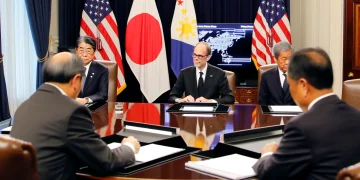During a recent summit held at the White House, leaders from Japan, the United States, and the Philippines announced a collaborative initiative aimed at strengthening the supply chains for nickel, a crucial element in the manufacturing of electric vehicle batteries. This trilateral agreement seeks to reduce dependency on dominant market players such as China and to bolster economic resilience among the participating nations.
The Philippines ranks as the second-largest global producer of nickel ore, positioned just behind Indonesia, while China holds a prominent role in the production of refined nickel. In response to the current market dynamics, the three nations have committed to fostering a more balanced and less concentrated supply chain. This strategy is expected to mitigate economic vulnerabilities and enhance material security.
The announcement followed a series of high-level meetings, including the U.S.-Japan-Philippines Commerce and Industry Ministerial meeting in Washington. Economy, Trade, and Industry Minister Ken Saito highlighted the shared recognition of these strategic mineral issues and the unanimous agreement on the urgency of ensuring economic security.
The summit concluded with a joint statement, underscoring the commitment of Japan, the Philippines, and the United States to support the critical minerals industries across their countries. The partners intend to engage other regions rich in resources and high in consumption, such as Europe and Africa, to develop a collaborative framework. This framework aims to facilitate the sharing of information and investment in critical minerals’ development.
Further discussions are planned to explore the expansion of nickel refining processes to diversify beyond the current major providers like China and to develop policies that effectively support this diversification. This includes addressing the challenges of reducing carbon dioxide emissions and production costs associated with mineral smelting, which are currently competitive in Chinese markets. The initiative also emphasizes the need for policies that encourage the procurement of environmentally considerate and sustainably sourced minerals, even if they come at a higher cost.
The collective move to enhance the supply chain of nickel and other critical minerals reflects a strategic effort to reduce reliance on single-source markets and to promote economic and environmental sustainability in the face of global trade pressures.















